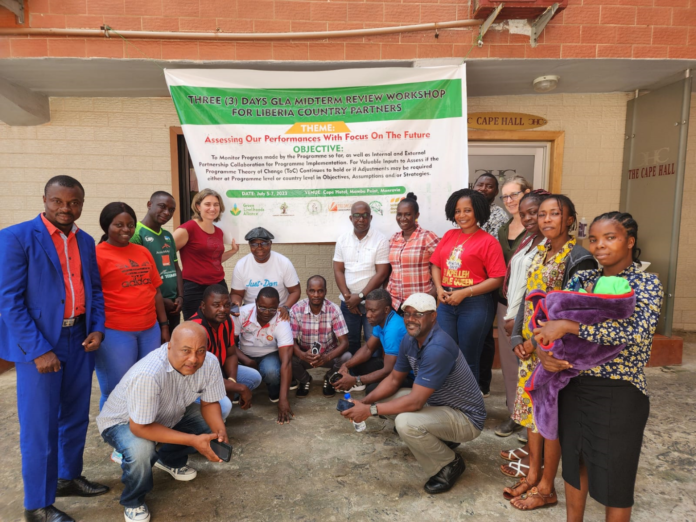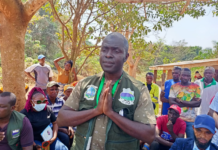
The Global Coordinator of the Green Livelihoods Alliance (GLA 2.0) Forest for a Just Future Program, Eva Duarte Davidson was in Liberia as guest of the Liberia Country Partners.
The Liberia country partners include: Rural Integrated Center for Community Empowerment (RICCE), The Daylight, Community Rights Support Facility (CRSF) and the Sustainable Development Institute (SDI) as the lead.
Members of the Liberia Country partners of the GLA between July 5-7,2023 conducted a three-day workshop as part of the Midterm Review (MTR). The MTR held at the Cape Hotel in Monrovia was under the theme: “Assessing our performances with focus on the future”. The MTR of the GLA covers the period from June to October 2023.
The overall objective of the MTR is to document progress made by the program so far, identify the gaps in the implementation timeframe, celebrate and document gains made through the first half of the program as well as review the internal and external partnership collaboration for program implementation.
Additionally, the MTR considers valuable inputs to assess if the program Theory of Change (ToC) continues to hold or if adjustments may be required either at program level or country level in objectives, assumptions and/or strategies.
Madam Davidson arrived in Liberia on Wednesday July 5, 2023. She was in th country in honor of the ongoing Midterm Review (MTR) of the program.
She participated in the three days’ workshop as part of the MTR and listened to some of the issues that came out in the meeting.
Speaking at the MTR, the GLA Global Coordinator said “With GLA, the program is great, but maybe we want to be more ambitious and if the progress is not so great, maybe we need to rethink about it. We will see if we need to change targets and we look at our Theory of Change (ToC). What happening here in Liberia is happening in every single GLA partner and they are collecting the same type of data. We have to evaluate where we are and the lessons learned and it is time to pause and reflect. All the analysis you will make are for Liberia, West Africa and maybe Africa.”
The GLA Global Coordinator later made a field visit in one of the project counties (Bomi). In the County, she interacted with the Western Region Women Organization Network Association (WERWONA), a women advocacy group setup by the SDI with funding from the GLA.
WERWONA is a conglomeration of all women advocacy groups in the western region of Liberia. This proactive group was established by the Sustainable Development Institute (SDI) under the Green Livelihoods Alliance (GLA 2.0) Forest for a just future program to do advocacy concessions, forestry, mining and other issues affecting women and children in that part of the country.
women advocacy group make progress
The Co-Chairlady of WERWONA explained how they have further cemented their relationship as advocates since their formation. According to Jereline S. Mambu, they used to have challenges in channeling their voices as organizations, but since the group formation by the Sustainable Development Institute (SDI) under the GLA program, they are now collectively speaking on issues affecting women ranging from concession areas, mining, forest amongst others.
“We are now engaging issues as a group under one organization and not like in the past when we used to speak from our individual organization point of view. We are speaking with one voice. We are together for unity. We never had the chance to speak on issues of land, mining, concession agreements among others. But today, we can discuss land issues and natural resource issues freely unlike in the past when it was very difficult,” she said.
She further said “For instance, we have had issues with the Liberian Government over the Mineral Development Agreement (MDA) it signed with Western Cluster Liberia Limited and their failure to have a memorandum of Understanding (MOU) with the 33 affected communities and villages,”
In a brief response in Tubmanburg, Bomi County, Madam Davidson commended the women for their work and encouraged them to hold together in their advocacy because they will achieve bigger things when they are together.
She later visited a certification program in Beaja, Manoah Clan, Senjeh District, Bomi County for Community Land Development Management Committees (CLDMCs) of seven clans who have gone through the first phase of the Customary Formalization Land Process (CFL).
The Liberia Land Authority (LLA) awarded the certificate in collaboration with the Community Rights Support Facility (CRSF). The project is implemented by the Community Rights Support Facility under the (GLA 2.0) Forest for a Just Future program (FfJF) through the Sustainable Development Institute (SDI).
Madam Davidson attends certification program
In her remark at the certification program, Madam Davidson said “Hearing about the certification process and the training before, I look forward to hearing that it goes forward. For the Green Livelihoods Alliance, we are working in eleven countries and Liberia is one of them. It is the first country I visit in West Africa and your community is the first in Liberia. Thank you for the opportunity and keep up the good work.”
She was greeted with a resounding applause from the excited participants while visiting Gayah Hill in Zepeh clan, Senjeh District, some communities affected by the operations of Mano Oil Palm Plantation.
In Gayah Hill, she interacted with the affected citizens along with the female Commissioner, Madam Rita Konah Harris.
Gayah Hill is one of the affected communities of Mano Oil Palm Plantation, formerly of Sime Darby Plantation Liberia (SDPL). In the meeting, the Commissioner of Senjeh District, Madam Rita Konah Harris lamented that the company has taken over their land and not doing anything for the affected citizens.
“No land rental fees. No assistance to the school constructed by the Liberian Government prior to their arrival. The company is not helping us. No safe drinking water, electricity, chemical used by the company on the farm is seriously affecting our water sources. We want to know the agreement that brought them here,” she said.
The Community Rights Support Facility (CRSF) supported by the GLA through the SDI is implementing a project in the community looking at Community Land Formalization (CLF). The citizens provided testimonies pointing to success of the project in their communities. According to them, they used to have land and boundary conflicts, but since the coming in of the CRSF, there is no case of land conflict again.
“We no longer have land conflict in our communities. We now have unity and we working together as communities and no conflicts again,” Madam Rita Konah Harris said.
After listening to the citizens, Madam Davidson lauded the communities for welcoming she and her team in their community.
She was accompanied into the field by Morris Nyain (Monitoring, Evaluation & Learning Officer), Reuben Sei Waylaun (Media & Communications Officer), James Tamba (SDI), Jacob Blamah (CRSF) and Titus Zeogar (CRSF) respectively.
Back in Monrovia and joined by Marijn Van Der Pas, Head of International Cooperation at Milieudefensic, Madam Davidson held series of meetings with the Liberia country partners, staff of the implementing program at Program/Department at SDI, Community Rights & Corporate Governance Program (CRCGP), the SDI Management Team and other Liberia’s development partners.






















